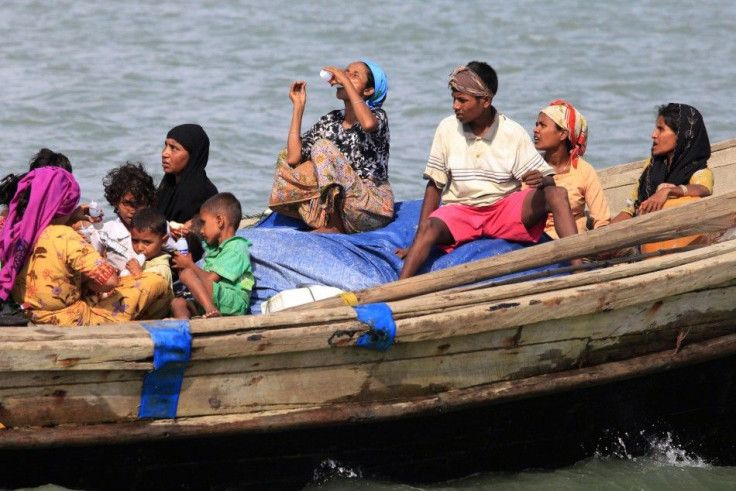A New Day in Myanmar? Not For The Stateless, Rejected Rohingya People

As Myanmar (formerly Burma) struggles to emerge from decades of a military dictatorship that only ended in 2010, sectarian violence has flared up recently in the western part of the country between two ethnic minority groups, prompting an iron-fisted response from the fledgling civilian government.
Violence in the impoverished state of Rakhine has spiraled out of control following the brutal rape and murder of a young woman last month.
The victim was an ethnic Rakhine Buddhist, the region's dominant minority group. The attack was blamed on three youths of the Rohingya Muslim ethnic group, a minority population unrecognized by Myanmar's government and labeled as illegal settlers from neighboring Bangladesh.
On June 3, a mob of ethnic Rakhines, seeking revenge, swarmed a bus carrying Rohingya Muslims, dragged 10 men out and beat them to death.
Since then, the violence has escalated, particularly in Rakhine's capital Sittwe, where reports of up to 25 more deaths have come out amid gunfire and burning buildings.
Myanmar's government declared a state of emergency in Rakhine on Sunday evening, putting the region under martial law.
In a country with a history of violent supression under junta rule and still rife with human rights abuses, the deployment of the military is a sign of political regression.
It's incredibly worrying, said Jennifer Quigley, Advocacy Director at the NGO U.S. Campaign for Burma. These are the very same people (the military) that have perpetrated human rights violations against numerous ethnic groups in the past.
The situation does not bode well for the nearly 800,000 Rohingyas estimated to be living in Rakhine, who have no legal status or rights in a country that has ostracized them.
A new day has not dawned when it comes to the military in Burma, Quigley said. If they haven't already, they will commit further human rights violations in the name of this state of emergency.
Already, Rohingyas are fleeing Myanmar to escape the violence, but they are finding themselves unwanted elsewhere as well.
Roughly 1,500 Rohingya refugees in boats have been turned away from Bangladesh in the past three days.
Bangladeshi Foreign ministry spokesperson Mohammad Monirul Islam Kabir said his country and Myanmar are maintaining close consultations to ensure that developments in the Rakhine state do not have any trans-boundary spillover, Bloomberg Businessweek reported.
The U.N. Refugee Agency has so far petitioned unsuccessfully for Bangladesh, an overpopulated and impoverished country, to take in the refugees.
With nowhere to turn, Rohingyas are perpetually stateless and seeking refuge.
The 'Boat People'
The Rohingya people are said to be of mixed ancestry, descended from Arab traders who sailed the coasts of the Indian Ocean centuries ago and intermingled with native Bengali and Rakhine populations.
The Burmese government has rejected this historical account, claiming that Rohingyas have only crossed into the country illegally from Bangladesh within the past few decades.
When Myanmar (as Burma) gained independence from Britain in 1947, the Rohingya people were not recognized as one of the country's official ethnic groups and were subsequently excluded from a 1982 citizenship act.
The Rohingya are virtually friendless amongst Myanmar's other ethnic, linguistic and religious communities, said the U.N. Refugee Agency in a 2011 report.
As well as being stateless, Myanmar's Rohingyas are confronted with other forms of persecution, discrimination and exploitation, the report continued.
These include (but are not limited to) forced labor, extortion, restriction on freedom of movement, the absence of residence rights, inequitable marriage regulations and land confiscation. The Rohingya also have limited access to secondary and tertiary education as well as other public services.
As a result, thousands of Rohingyas have sought refuge in surrounding countries, despite efforts by various governments to keep them out.
According to U.N. Refugee Agency estimates, as many as 400,000 Rohingya are living in Bangladesh, a similar number in the Gulf states, 200,000 in Pakistan, 20,000 in Thailand and 15,000 in Malaysia.
In most cases they are unrecognized under amnesty laws and subjected to similar abuses in other countries that they face in Myanmar, that is, if they manage to land their fishing boats ashore.
They've been called the 'boat people,' Quigley said. There are many cases where they arrive and are just pushed back out to sea.
© Copyright IBTimes 2024. All rights reserved.





















